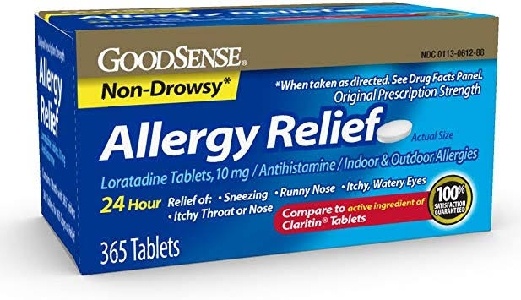While vegans are less likely to have allergy problems, sometimes we still unfortunately suffer from allergies. Be it a strange itchiness like I personally get, or tons of sneezing, watery eyes, or whatever else, it’s certainly not fun.
Table of Contents
Thankfully, some allergy medicines are in fact 100% Vegan-friendly. Not all allergy medications are vegan-friendly though, some contain gelatin or other contaminants that make them non-vegan.
What Makes Some Allergy Medicines Non-Vegan?
There’s many things that can cause an allergy medicine to be non-vegan, but the most common is the capsules or coating on the outside is made with gelatin, an ingredient which comes from boiled animal bones and ligaments.
Other reasons a certain brand may be non-vegan is if they have funded or performed animal testing of the product, or if it contains certain coloring agents such as Carmine, which comes from crushed beetles.
What Brands of Allergy Medicine are Vegan?
A general rule of thumb is that if it’s a generic knock-off or no-name brand it’s likely vegan, and if it’s a name-brand it’s almost certainly non-vegan. An easy way to tell is to check the ingredients for gelatin and make sure the color of the pill isn’t red, as that suggests it may contain carmine that may be or may not be listed in the inactive ingredients.
Generally Vegan-friendly brands (!check for lactose monohydrate, ingredients may be different in your country or region!) include:
- Equate (Walmart)
- H-E-B Brand
- CVS Brand
- Benadryl Originals (not gel)
Those are some common brands that don’t, and never have, tested on animals for those specific products, and do not contain any non-vegan ingredients as well. So they’re 100% Vegan.
Personally, I’d recommend buying benadryl off Amazon, as they’re one of the cheapest vegan one’s available online and at least for me they’re effective. They’re vegan and generally are sold for like 2/3rd’s the price of store-brands in stores and way cheaper than other brand-names.
What if Generics/Benadryl don’t work for me?
While Generics and name-brands are supposed to be equally effective they aren’t always. This is because there’s a margin of error allowed in medication levels compared to what’s advertised, and generics often in end up having slightly less than name-brands as a result.
If generics aren’t working for you it might be a good idea to take slightly more and see if that fixes the issue. If it doesn’t, as non-generics were developed as unique products/chemicals they are required to test on animals before they go to market, and thus all of them were tested on animals. However, if generics just aren’t working remember veganism is about what’s practical and reasonable.
It’s not reasonable to suffer from allergies and be excruciatingly itchy or unable to go 5 minutes without sneezing — because of this it’s fine to take a name-brand as a vegan if they’re all that works for you. I’d suggest you not support brand-names, and opt for generics that didn’t pay for animal testing, but if they’re all you have access to or all that work for you it’s not causing additional harm to animals to take them in most cases (confirm they’re gelatin & carmine free).
If Zyrtek, Allegra, or Claritin, is all that works for you then take them if necessary. But ideally buy a generic that wasn’t tested on animals (many years ago) if they do work for you and you use allergy medicine frequently.
What Antihistamine Tablets are Vegan?
Cetirizine is one of the most common allergy medicines out there — It’s generally the cheapest one and generally what most generics are made out of. It’s definitely 100% Vegan, as are most of the brands that use it as an active ingredient. Just check for Gelatin if it’s a “soft-capsule” or opt for a hard tablet and it should be vegan-friendly.
Other anti-histamine medicines that are potentially vegan-friendly is loratadine, fexofenadine, and levocetirizine. Buy them from a generic manufacturer (if possible) to not support the original brand, as brand-names generally have a history of animal-testing.






